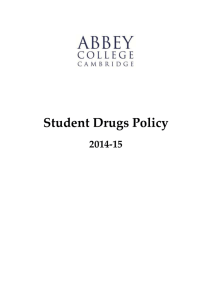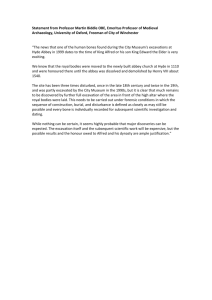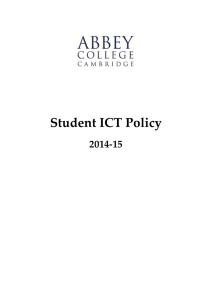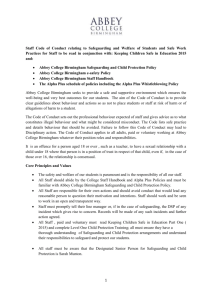Organisation and implementation of college drug policy
advertisement
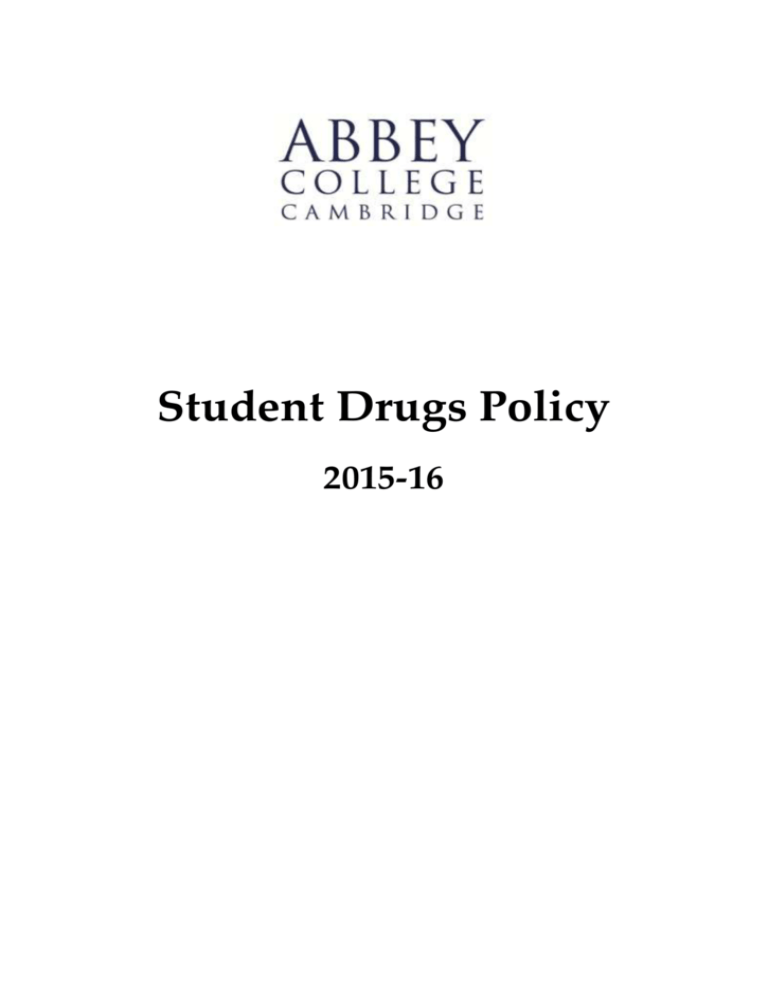
Student Drugs Policy 2015-16 Student Drug Policy 2015-16 Abbey College Cambridge Student Drugs Policy Abbey Cambridge and Alpha Plus Group The ACC Senior Leadership Team are responsible for this policy: Karen Lonsdale, Vice Principal (Pastoral) Telephone: 01223 578280 Email: Karen.Lonsdale@abbeycambridge.co.uk This policy is reviewed on an annual basis Annual Policy reviewed by: Karen Lonsdale Annual Review date: September 2015 Next date of Annual Review: August 2016 This policy has been adopted by the governors, is addressed to all members of staff and volunteers where appropriate, is available to parents on request and is published on the school's website if appropriate. Page 1 of 6 Sep 2015 Student Drug Policy 2015-16 Abbey College Cambridge Student Drugs Policy Abbey College Cambridge Definition of drugs For the purposes of this college policy the term ‘drugs’ is taken to mean the following: Illegal substances of all classes Illegally distributed prescribed drugs Solvent abuse New psychoactive substances Smoking Alcohol Over-the-counter medicines Statement of policy The college condones neither the misuse, nor illegal supply, of drugs by members of the college. The college acknowledges the importance of its pastoral role in the welfare of its students, and will take action to support and safeguard their well-being. Aims To promote the personal, social and moral development of students and thus prepare them for the opportunities and experiences of life. To encourage students to have due regard to the legal, social and physical risks involved in drug use and misuse. To inform students in a balanced and truthful way about the use/misuse of drugs and the cultures surrounding them. To enable students to understand accurately the biological and psychological effects of legal and illegal drugs and to provide them with sufficient information to protect themselves and others from the effects of drug misuse. To keep up-to-date with developments in the drug field, thus ensuring that accurate and current information is made available to the students. To raise awareness among teaching staff of drug issues, thus ensuring an informed, measured and reasonable approach. To enable students to understand aspects of legislation relating to drug use and to make them aware of sources of help and advice available within the family, the college and the community. To ensure students understand that each drug experience is unique and different types of drugs will affect individuals in different ways at different times. Organisation and implementation of college drug policy Drugs education within the college is taught as part of the personal tutor study programme. Confidentiality Teachers cannot promise confidentiality to students. Where a student’s actions are likely to place that student or others at moral or physical risk or in breach of the law, the tutor will Page 2 of 6 Sep 2015 Student Drug Policy 2015-16 Abbey College Cambridge inform the Principal or Vice Principal who will, if appropriate, arrange for the student to be counselled and the parents to be informed. Tutors must be aware that holding on to information may compromise them at a later date. Procedures The following are recommended guidelines for specific drugs related incidents. Each incident is unique and therefore the guidelines should be used as a reference rather than a set of rules. The designated governor is Jenny Aviss. Change in a student’s behaviour If a member of staff notices a change in a student’s behaviour, as follows: The change involves uncharacteristic behaviour of more than one week’s duration The degree of the behavioural change is considered significant and negative (withdrawal, appearance of ill-health, distraction, absenteeism, irrational mood swings, etc) They should initially speak with the student’s Personal Tutor, who is required to inform the college’s Designated Safeguarding Lead. Any response will be carefully and objectively recorded and placed in the student’s file. Reported Rumour Rumours relating to drugs being taken by students during college time must be reported to the VPP, who will investigate them and take appropriate steps: Reported by A fellow student In this situation the first intention should be to speak with both the student reporting the rumour and the student involved. From this point, further action clearly depends on the responses of the students, but care should be taken not to make accusations or reveal the source. Reported by A Parent, relating to their own child The college will attempt to understand how much of the information given is fact rather than speculation, but generally should recommend counselling and/or talking to the designated safeguarding lead who can offer support to the student and family, and if necessary supply contact numbers for relevant groups and organisations. By a parent, relating to another child Initially the college will establish where the parent received the information from. Actions will be determined by the credibility of the allegation. The designated safeguarding lead and Pastoral Head will decide whether to take further action (e.g. involve the authorities, the accused student’s parents etc) as appropriate for each case. Page 3 of 6 Sep 2015 Student Drug Policy 2015-16 Abbey College Cambridge Disclosure If a student discloses information regarding drug use to a member of staff, the issue of confidentiality should be clearly explained to the student: the staff member cannot promise not to reveal the information. The Designated Safeguarding Lead will be consulted immediately. Parental contact will be taken up, and this should be explained to the student. The nature of the information disclosed will affect any further action taken. Drugs found on the premises This must be reported to the Principal immediately. Students and drugs on the premises In cases of Student(s) found to be carrying drugs on the premises, Student(s) taking drugs on the premises, Student(s) dealing drugs on the premises, The student(s) involved will be isolated with as little discussion as possible and the following members of staff informed immediately: Vice Principal Pastoral and the Principal. The student(s) has the right to request a specific member of staff to be present, and a member of the management team must also be involved in all questioning. The student(s) will be encouraged to hand over any drugs they have in their possession, but staff will not attempt to take the drugs off them. Any drugs handed over should be stored in the college safe, having been carefully labelled with all relevant details and the label signed by two members of staff and the student(s) involved. The staff involved will attempt to establish the facts of the incident and if there are any further drugs in college. The parents will be contacted by the Pastoral Head, and called in to the college wherever possible. Throughout this time the student(s) will remain isolated. Counselling and support will be the primary recommendation made to parents. Questions of exclusion and police involvement are dependent on the nature of the incident, and will be carefully considered by the Vice Principal Pastoral and Principal. The college reserves the right to perform random bag checks during college hours if it is suspected that drugs have been brought into the college. Alcohol You can be stopped, fined or arrested by police if you’re under 18 and drinking alcohol in public. If you’re under 18, it is against the law: for someone to sell you alcohol to buy or try to buy alcohol Page 4 of 6 Sep 2015 Student Drug Policy 2015-16 Abbey College Cambridge for an adult to buy or try to buy alcohol for you to drink alcohol in licensed premises (e.g. a pub or restaurant) If you’re 16 or 17 and accompanied by an adult, you can drink (but not buy) beer, wine or cider with a meal. If you’re 16 or under, you may be able to go to a pub (or premises primarily used to sell alcohol) if you’re accompanied by an adult. However, this isn’t always the case. It can also depend on the specific conditions for that premises. Occasionally students with the correct ID may drink alcohol in moderation at College events with meals. It’s illegal to give alcohol to children under 5. Consequences of breaking the law: If the police suspect someone under 18 has alcohol in a public place, they have the power to confiscate it. If young people get caught with alcohol three times they could face a social contract, a fine or arrest. Getting a criminal record could affect future job prospects and make it more difficult to travel to countries like the USA. The police can also confiscate alcohol from someone, no matter what their age, if they believe it has been, or will be drunk by someone under 18 in a public place. In the short term, drinking too much can impair academic performance because it affects concentration and makes you more likely to miss classes, hand in work late and do badly in exams. It can also put you at immediate risk of serious harm, ranging from date rape to car crashes. If you’re drunk, you’re also more likely to be a victim of violence or to have unprotected sex, which carries all the associated risks of sexually transmitted infections (STIs) and unplanned pregnancy. In the longer term, regularly drinking too much can cause liver disease, an increased risk of heart attack, weight gain and a number of different cancers. These problems are now occurring at younger ages as alcohol use has increased. Talk to your GP, the School Nurse and visit http://www.drinkaware.co.uk if you are worried about alcohol use. Tobacco The minimum age for smoking is 18. As with alcohol, there can be a lot of social pressure for students to smoke. Page 5 of 6 Sep 2015 Student Drug Policy 2015-16 Abbey College Cambridge Smoking increases your risk of lung cancer and heart disease. It prematurely ages the skin and triples your chance of getting wrinkles around your eyes and mouth. It also causes impotence and reduced sperm count in men, and reduces fertility in women. It can lead to gum disease, makes the body store fat around the waist and increases the risk of cellulite. Don’t assume that smoking will help you through the stress of exams. Medical evidence shows that smoking doesn’t actually calm you down. It’s simply the case that nicotine cravings between cigarettes make you feel stressed and anxious, so when you have one you feel temporarily calm. You’ll feel less stressed once you quit and no longer have cravings Please ask the Nurse, your GP or the Chemist about smoking cessation. Managing medications Please see the Medical Care Policy for information about this. New psychoactive substances (NPS or ‘legal’ highs) These mimic the effect of illegal drugs and despite being labelled as ‘legal’ are not always safe to use and often contain controlled drugs, making them illegal to possess. They will be treated as unauthorised substances. Many drugs that were previously sold as legal highs are now controlled under the Misuse of Drugs Act, including mephedrone (meow meow/mcat), naphyrone, BZP and GBL. This means that they are illegal to possess or to supply to others. There are lots of different types of synthetic cannabinoids and a large number have become Class B drugs. Legal highs can carry serious health risks. The chemicals they contain have in most cases never been used in drugs for human consumption before. This means they haven't been tested to show that they are safe. Users can never be certain what they are taking and what the effects might be. Other risks: You increase the risk to yourself if you combine alcohol with any legal or illegal substance that causes a high. Effects of legal highs can include reduced inhibitions, drowsiness, excited or paranoid states, coma, seizures and, in a few cases, death. Because the chemical ingredients in a branded product can be changed without you knowing, the risks are unpredictable. Even drugs that look similar or have similar names may be of varying strengths and have different effects. Most problems with short-term use of legal highs will settle after you stop taking them. However, the negative effects of some legal highs can take a few days to wear off completely, just like the comedown from stimulants such as cocaine or amphetamines. Page 6 of 6 Sep 2015 Student Drug Policy 2015-16 Abbey College Cambridge If you think you are having a serious negative reaction soon after taking a legal high or you experience problems that do not settle with a little time out, fluids and fresh air, get medical help straight away by going to the accident and emergency (A&E) department of your nearest hospital. If you are worried about continuing health problems after you've stopped taking the drugs, visit your GP. But if you think further advice would be helpful before deciding whether to visit your GP, call the FRANK drugs helpline on 0300 123 6600, or NHS 111. Code of good practice From time to time questions may be raised by students which the Personal Tutor or subject Teacher may have difficulty in addressing, due to its nature and content. The staff member in question is not required to answer such questions immediately. In such cases they are advised to defer a reply and consult the Designated Safeguarding Lead before taking further action. Teachers and tutors are urged to use their skill, good sense and discretion in such situations. The recommended ground rules involve the students being able to ask anything they wish as long as they respect the right of both staff and other students not to answer questions if they do not wish to. Screening for Drugs All students should come to college ready to work and learn. For the vast majority of students this is the prime objective. However, there are many pressures on young people these days, particularly with respect to drugs. In recognition of this fact the college reserves the right to insist that if a student is suspected of taking harmful substances they should be subjected to a drugs test. If a student comes under suspicion of taking drugs they may be screened at short notice. Should we feel that such a course of action is necessary every effort will be made to inform parents and guardians of our intentions. Our suspicions may be aroused for the following reasons: Non-attendance Persistent lateness Unusual behaviour, as outlined above Lack of concentration Physical symptoms (tiredness; dilated pupils; skin pallor) It is deemed that the quality of a student’s work is well below their usual standard. In the event that evidence is found of drug-taking, action taken by the Pastoral Head will include calling in the Police. Further appropriate actions will also be taken. As an example, if a student is found to have consumed cannabis, he or she will be given a final warning and, at the parents’ expense, regular drugs testing (approximately £60 per test) will ensue. Attendance of a course of counselling may also be a condition of continued college membership. Should any subsequent test prove positive for cannabis the student will be dismissed. Students whose laboratory test report indicates the presence of any other illegal drug(s) will face disciplinary action and may be excluded from the school. Page 7 of 6 Sep 2015 Student Drug Policy 2015-16 Abbey College Cambridge Any student under suspicion who refuses to be screened will be considered to be in breach of the agreed policy regulations, and in consequence will be dismissed from the college. Anyone found in possession of illegal substances on college premises or outside the college and under the supervision of the college - for example on college trips – will face disciplinary action and may be excluded from the school. Page 8 of 6 Sep 2015
